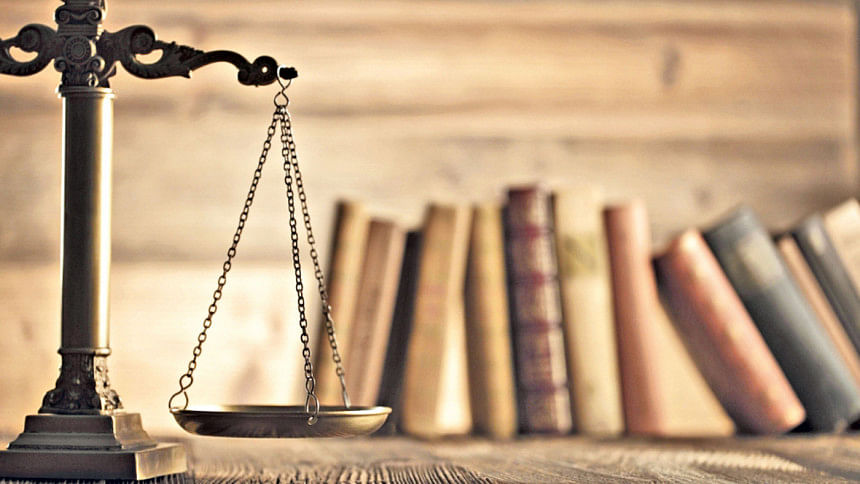The Non-Lower or Non-Subordinate Judiciary of Bangladesh

Recently, this writer happened to have invited a friend, a judicial officer, to deliver a guest lecture on the functioning of our 'lower judiciary'. As humble as the colleague was, he could not but have a soft but clear jibe at the categorisation 'lower judiciary'. And very justifiably so. Indeed, the term lower judiciary does not even have a place in the Constitution. It is a coinage of usage. It is submitted here that whatever it may connote, the adjective 'lower' should not be used to categorise a whole bunch of courts with different jurisdictions. More on that later. As a mortified host, this author apologised sincerely. Apology was 'accepted' (though one can only have an impression, one can hardly have a conviction on a psychological state. Be that or not, damage was done, perhaps irrevocably. Indeed, as impetuous as this writer may be, in this case, he did not choose the word lightly. By no means, was the choice of 'lower judiciary' completely random. As a self-proclaimed non-elite (rightly or not), someone professing cherishing a dream of an egalitarian Bangladesh, the 'lower' was not a comfortable choice. It was preferred to the 'sub-ordinate' judiciary. The differentiation was based on the thought that 'lower' in this context, carries a conspicuous negative connotation, but sub-ordinate may arguably convey a more pronounced negative connotation. To laypersons, the literary meaning of sub-ordinate is anathema to the very idea of a court free from undue interference.
Some of these may, at times, be an inevitable reality that societies cannot wipe out or do away with disparities or ranks. Time passes, expressions changes. The stratified society that lies as the underbelly of the superficially homogenous society of Bangladesh is the words – lower or subordinate can hardly befit courts.
This brief write-up is not an apology for the philosophically indefensible choice that this writer has made. It is rather a surprise that these words with a whole range of courts in Bangladesh where a very high proportion of the entire caseloads rest have not been a matter of intense scrutiny. One possibility is the traditional dogmatic legal culture of adherence to tradition. The doctrine of stare decisis that like cases should be decided in like manner, is based on solid foundation and serve many very useful functions. However, the training on precedents may at times make law students (in a generic sense to include lawyers, judges, law academics) faithful adherents to tradition without questions. To not depart from the ratio of a decision is one thing; uncritical adherence to tradition is another thing.
Legal history may offer us some insights into how these terms took root in our legal parlance. Deep dive into legislative history may also offer some insights on what rationale/s drove the choices. Originalism or other means of interpretation of texts may guide us on their means of interpretation. This page is not the right forum for such an exercise.
One may contend that the use of lower or subordinate is to indicate their different status from that of the Supreme Court. Placed at the pinnacle of the Bangladesh judiciary, the Supreme Court, with its unique structure deserves a special appellation fitting its unique status among all courts in Bangladesh. The Supreme Court has a constitutional function to play a role in the consistent development of case law through its precedents. However, nowhere in the Constitution, does such a function seem to be envisaged for the subordinate courts of Bangladesh. This distinction appears to be a conscious design of the framers of the Constitution. In part VI of the Constitution, the Supreme Court and subordinate courts are placed in different chapters, and provisions relating to them are also worded in quite disparate ways. Noticeably, the Constitution addresses the judges of the Supreme Court as 'Judges', whereas the corresponding term for the others is 'judicial officers'. Having said that, the supreme status of the Supreme Court in the judiciary of Bangladesh does not in any way necessitate a term conveying any subaltern rank for the other courts who are under the administrative control of the Supreme Court and whose judgments are challengeable at the Supreme Court. 'Lower' is a relative term and may be applicable when a court is exercising some sort of judgment over another's decision. But in that case, courts falling under the category of subordinate or lower courts are not positioned at the same level and one may have the authority to hear an appeal or revision from the decision of another.
Depending on perception, any classification may connote some form of negativity. To take just one example, a Magistrate of the first class conveys some subaltern status for the second class and so on. Some of these may, at times, be an inevitable reality that societies cannot wipe out or do away with disparities or ranks. Time passes, expressions changes. If one thinks it was quite okay to use 'handicapped' which in most contexts would convey at least some degree of insensitivity these days. Words like 'disabled', 'persons with disabilities' or perhaps 'especially abled' would possibly convey more thoughtfulness or compassion. The stratified society that lies as the underbelly of the superficially homogenous society of Bangladesh is the words – lower or subordinate can hardly befit courts.
The next question could be, if these two terms are unsatisfactory, what could be the alternative/s? As legitimate a question as that may be, it is not a question without answers. English or Bengali language is not so poor. Nor are our linguists or jurists so bereft of ideas. Indeed, all strata of so-called 'subordinate' or 'lower' courts have distinct names already.
The writer is Professor of Law and Member, Center for Peace Studies, North South University.

 For all latest news, follow The Daily Star's Google News channel.
For all latest news, follow The Daily Star's Google News channel. 



Comments